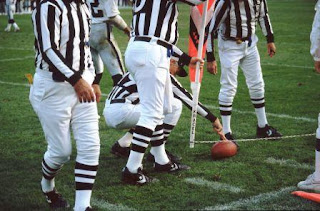My local cable company, which I'll call "Bombast" for no other reason than I like pseudonyms (even when they're nonsensical), is pissing me off.

After a week in which I already lost power and sprained my ankle, I came home on Friday night, after visiting the doctor for x-rays of said ankle, to find that my cable was out. This not only affects my TV watching, but also my internet connection, which I get through cable, and my landline phone, which goes through my internet (
VoiP.)
So, using my cell phone, I called Bombast's customer service and, navigating an annoying automated menu, finally talked to a live person. Unfortunately, the annoying automated menu made me choose between a cable TV issue and an internet issue, and I made the wrong choice. The guy at the cable TV service line was not listening to me when I told him my issue, or else he had no choice but to a follow a script that doesn't allow for my type of problem. He kept having me turn my cable box on and off, and I kept telling him that the problem wasn't that my cable box wasn't working, but that I wasn't getting any internet, either, so it was the CABLE LINE COMING INTO MY HOUSE that needed fixing.
While I was on hold with him, my cell phone died. You see, I hardly ever talk on my cell, and mostly use it just for texts. So I don't usually need much battery power, and I don't recharge it very often. Hence, the battery died while I was on the phone with the incompetent man from Bombast. Now I was really cut off from the outside electronic world: No cable, no internet, no landline, no cell. Since all of this was beyond my control (i.e. I didn't choose to take an offline vacation) it was terrifying and disorienting.
Finally I was able to recharge my phone enough to call Bombast back, navigate the annoying automated menu, and this time choose "internet connection problems." This guy was more competent than the last, and noted that he couldn't get any signal whatsoever into my house. EXACTLY!!!! Thanks for noticing. He determined that a technician would have to come out to my house to check the external lines.
Unfortunately, he said, the soonest he could schedule an appointment would be next Wednesday, five days away. But, he would "escalate" my issue so that someone would probably be able to come to my house this weekend. That sounded good, since I had no intention of taking time off work to stay home all day and wait for the cable guy. He asked for my phone number, because the technician would call before they would come. I gave him my cell number, since obviously my landline-- which goes through my internet, which goes through my cable-- was out of service. When he read back the last four digits of my cell number to me, he had it wrong, which did not instill confidence in me.
So all day Saturday I kept checking my phone to see if they'd call.
They never did.
By about 2:30 Sunday afternoon I was pretty sure I'd been lied to. Bombast was like a sleazy guy after a desperate one-night stand: they had no intention of calling me. I re-evaluated my options and called them back. Navigated the annoying automated menu, finally spoke to a human, who confirmed that, no, they would not be visiting me this weekend. My appointment was for Wednesday morning between 7:30 and 10:00 am.
So I figured I would have to take some of my precious little personal business time off work to wait for the damn cable guy.
On Monday I arrange to take Wednesday morning off work. Later I check my home voicemail from work and find that Bombast has left me a message (automated, of course). There was an issue in my area that they have resolved, so they've canceled my appointment for Wednesday. Huh? This pisses me off for two reasons. First, if there was an area-wide issue, why couldn't they have told me that on Friday and saved me a weekend of anxiety? And two, how do they know that fixed the issue at my house? Why did they go ahead and cancel my Wednesday appointment without confirming that it works?
So I get home Monday night and, sure enough, cable is still out. The lights on my cable modem, telephone modem, and cable box still blink red, nagging me to fix them. I restart everything, but no dice.
I call Bombast again. Navigate the annoying automated menu. Every time that I've done this, I've had to listen to an automated voice tell me helpful things like, "Make sure your modem is plugged in" and "You can chat with customer service representatives on our website at..." This infuriates me. If I could get on the fucking website, I wouldn't be calling you! I have no website access, because I have no internet access, because my fucking cable is broken! Every time I hear this message, I feel like I'm being mocked.

So then I get a live person. At this point I'm much less patient and tolerant than I was the first three fucking times I called them. I ask why they 1.) told me my cable was fixed when it wasn't, and 2.) canceled my Wednesday appointment. After waiting forever while the guy looks up my account, using my escalation number, my reference number, my name, address, and the names of my first dozen elementary teachers, he tells me that the problem in the area was not fixed. No kidding. They didn't cancel my appointment. Then why the fuck did they leave a message to that effect? What kind of incompetent miscommunication is going on at this stupid corporation?
(Whenever conservatives rail against the inefficiency of big government to provide services, I'd like to point them to examples like Bombast, a for-profit company that appears to be just as fucked up as any government agency. But at least the government agency isn't screwing you over to make someone else rich.)
So I guess I'm right back to where I thought I was before I heard the automated voicemail from Bombast. Of course, the tech support guy has no good answer as to why I received that message to begin with. He does, however, have the moxie to ask me if I'd like to try some other service that Bombast offers. Seriously? I'm frustrated and angry and showing it, because my current service doesn't work, and you want to shill more stuff? "Um, I'd like to get the things I pay for to work before I think about any new services," I said. Wow, that took some balls! I'd like to nominate this guy for Stephen Colbert's Alpha Dog of the Week.

You would think that would be the end of the story, at least until Wednesday morning. But later that night I get a call. From Bombast. The lady clearly has no idea what I've been through the past four days, because she's confirming my appointment on Wednesday. She asks me to explain what is wrong with my cable. "You're having a problem with your TiVo?" (I think I mentioned my TiVo in my very first phone call.) Are you fucking kidding me? I've talked to four people over four days about this problem, and you still don't know?
The cherry on top of this customer service shit sundae is that she verifies the phone number the technician is supposed to call before he comes. She lists my landline number. NO, NO, NO! I've given four people my cell number and told them to use that!! How can you still have it wrong?
My English teacher in high school used to tell us that millions of dollars are lost every day in the business world because of poor communication. He was trying to get us to see the value of English as a course of study, but I see much wider implications for that statement. I'm so angry at this breakdown in communication, I'm... I'm... I'm... well, I'm mad enough to write a letter.
And blog about it.
 Scientists trained capuchin monkeys to use money. They gave them coins and slowly taught the monkeys that they could use those coins to buy food. After several months, the coins soon become just as important as food.
Scientists trained capuchin monkeys to use money. They gave them coins and slowly taught the monkeys that they could use those coins to buy food. After several months, the coins soon become just as important as food. The answer became much more clear when, seconds after this transaction, the two monkeys were having sex.
The answer became much more clear when, seconds after this transaction, the two monkeys were having sex. 






